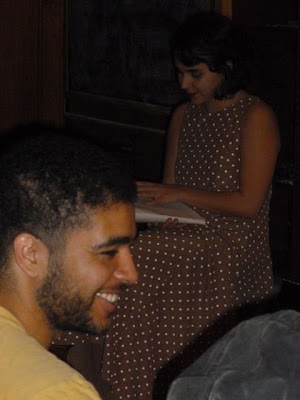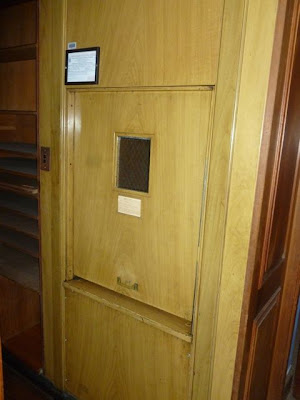Paul Legault
Saturday, September 15, 2012
4:00 pm—5:00 pm
McCormack Family Theater 70 Brown Street (at Fones Alley)
Paul Legault was born in Ontario and raised in Tennessee. He holds an
M.F.A in Creative Writing from the University of Virginia and a B.F.A.
in Screenwriting from the University of Southern California. He is the
author of two books of poetry, The Madeleine Poems (Omnidawn, 2010)
and The Other Poems (Fence Books, 2011). He co-founded and co-edits
the translation press Telephone Books. He'll be reading from his new
book, The Emily Dickinson Reader. In this original collection,
Dickinson classics are reinterpreted by a modern voice.
Interface Play
Sunday, September 16, 2012
8:00 pm—9:00 pm
Granoff Center - Studio 1 154 Angell Street
An organic, interdisciplinary performative digital arts event integrating image, text and sound, featuring new work generated through a multi-day workshop by artist Catherine Siller.
A graduate of RISD's Digital + Media MFA program, Catherine Siller uses technology to integrate sculpture, video, performance, and creative writing into a hybridized, process-oriented creative practice. Her most recent work centers on developing dynamic systems for structured improvisations--computer programs that change dynamically in response to her movements and in response to which she moves. Catherine received her BA in Visual and Environmental Studies from Harvard University. She has studied mixed media with Grace Knowlton at the Art Students League of New York; theater with the SITI Company, the Atlantic Theater Company, and Circle in the Square; and dance with Igal Perry, Marcus Schulkind, Nicole Wolcott, and through a Radcliffe Externship with Juilliard's Dance Department. She has performed and shown her work in New York and New England. For more info visit: http://catherinesiller.com/
Martin Corless-Smith
Tuesday, September 18, 2012
2:30 pm—3:30 pm
McCormack Family Theater 70 Brown Street
Martin Corless-Smith is the author of English Fragments: A Brief History of the Soul; Swallows; Nota; Complete Travels; and Of Piscator. A limited edition chapbook,Roman and Moscow Poems, was published in 2011. Born and raised in Worcestershire, England, he has studied painting and poetry, with degrees from the University of Reading, Southern Methodist University, the Writers Workshop at the University of Iowa, and a Ph.D. from the University of Utah. He is currently director of the M.F.A. Program in Creative Writing at Boise State University.
Lynne Tillman
Thursday, September 27, 2012
2:30 pm—3:30 pm
McCormack Family Theater 70 Brown Street
Lynne Tillman’s most recent book, and fourth collection of stories, Someday This Will Be Funny, was published in April 2011 by Red Lemonade Press. Her most recent novel,American Genius, A Comedy, was published by Soft Skull Press in 2006, and was cited as one of the best books of the Millennium (so far) by The Millions. Her other novels areHaunted Houses, Motion Sickness, Cast in Doubt, and No Lease on Life, a finalist for the National Book Critics Circle Award in fiction and a New York Times Notable Book of the Year. She has published three nonfiction books, including The Velvet Years: Warhol's Factory 1965-67, based on photographs by Stephen Shore. Her other story collections include This Is Not It, stories and novellas written in response to the work of 22 contemporary artists. Her work has appeared in the journals Tin House, McSweeney’s,Black Clock, Bomb, Aperture, and Conjunctions; her criticism in Artforum, Frieze,Aperture, Nest, The Guardian, and The New York Times Book Review. Tillman is Professor/Writer-in-Residence at The University at Albany, and teaches at The New School, as well at School of Visual Arts in New York City.
Brian Evenson
Tuesday, October 9, 2012
2:30 pm—3:30 pm
McCormack Family Theater 70 Brown Street
Brian Evenson is the author of twelve books of fiction, most recently Immobility (2012) and Windeye (2012). His other books include Last Days (which won the American Library Association's award for Best Horror Novel of 2009) and the story collection Fugue State, both of which were on Time Out New York's top books of 2009. His novel The Open Curtain (Coffee House Press) was a finalist for an Edgar Award and an IHG Award. His work has been translated into French, Italian, Spanish, Japanese and Slovenian. He lives and works in Providence, Rhode Island, where he directs Brown University's Literary Arts Department. Other books include The Wavering Knife (which won the IHG Award for best story collection), Dark Property, and Altmann's Tongue. He has translated work by Christian Gailly, Jean Frémon, Claro, Jacques Jouet, Eric Chevillard, Antoine Volodine, and others. He is the recipient of an NEA Fellowship and three O. Henry Prizes.
Erín Moure
Thursday, October 18, 2012
2:30 pm—3:30 pm
McCormack Family Theater 70 Brown Street
Montreal poet Erín Moure has published seventeen books of poetry plus a volume of essays, My Beloved Wager. She is also a translator from French, Spanish, Galician (galego), and Portuguese, with twelve books translated of work by poets as diverse as Nicole Brossard, Andrés Ajens, Louise Dupré, Rosalía de Castro, Chus Pato and Fernando Pessoa. Her work has received the Governor General's Award, the Pat Lowther Memorial Award, the A.M. Klein Prize (twice), and was a three-time finalist for the Griffin Poetry Prize. Moure holds an honorary doctorate from Brandon University, Manitoba, Canada. Her latest works are The Unmemntioable (House of Anansi), a poetic investigation into subjectivity and wartime experience in western Ukraine and the South Peace region of Alberta, and Secession (Zat-So), her fourth translation of internationally acclaimed Galician poet Chus Pato.
Paul Legault
Saturday, September 15, 20124:00 pm—5:00 pm
McCormack Family Theater 70 Brown Street (at Fones Alley)
Paul Legault was born in Ontario and raised in Tennessee. He holds an
M.F.A in Creative Writing from the University of Virginia and a B.F.A.
in Screenwriting from the University of Southern California. He is the
author of two books of poetry, The Madeleine Poems (Omnidawn, 2010)
and The Other Poems (Fence Books, 2011). He co-founded and co-edits
the translation press Telephone Books. He'll be reading from his new
book, The Emily Dickinson Reader. In this original collection,
Dickinson classics are reinterpreted by a modern voice.
M.F.A in Creative Writing from the University of Virginia and a B.F.A.
in Screenwriting from the University of Southern California. He is the
author of two books of poetry, The Madeleine Poems (Omnidawn, 2010)
and The Other Poems (Fence Books, 2011). He co-founded and co-edits
the translation press Telephone Books. He'll be reading from his new
book, The Emily Dickinson Reader. In this original collection,
Dickinson classics are reinterpreted by a modern voice.
Interface Play
Sunday, September 16, 20128:00 pm—9:00 pm
Granoff Center - Studio 1 154 Angell Street
An organic, interdisciplinary performative digital arts event integrating image, text and sound, featuring new work generated through a multi-day workshop by artist Catherine Siller.
A graduate of RISD's Digital + Media MFA program, Catherine Siller uses technology to integrate sculpture, video, performance, and creative writing into a hybridized, process-oriented creative practice. Her most recent work centers on developing dynamic systems for structured improvisations--computer programs that change dynamically in response to her movements and in response to which she moves. Catherine received her BA in Visual and Environmental Studies from Harvard University. She has studied mixed media with Grace Knowlton at the Art Students League of New York; theater with the SITI Company, the Atlantic Theater Company, and Circle in the Square; and dance with Igal Perry, Marcus Schulkind, Nicole Wolcott, and through a Radcliffe Externship with Juilliard's Dance Department. She has performed and shown her work in New York and New England. For more info visit: http://catherinesiller.com/
Martin Corless-Smith
Tuesday, September 18, 20122:30 pm—3:30 pm
McCormack Family Theater 70 Brown Street
Martin Corless-Smith is the author of English Fragments: A Brief History of the Soul; Swallows; Nota; Complete Travels; and Of Piscator. A limited edition chapbook,Roman and Moscow Poems, was published in 2011. Born and raised in Worcestershire, England, he has studied painting and poetry, with degrees from the University of Reading, Southern Methodist University, the Writers Workshop at the University of Iowa, and a Ph.D. from the University of Utah. He is currently director of the M.F.A. Program in Creative Writing at Boise State University.
Lynne Tillman
Thursday, September 27, 20122:30 pm—3:30 pm
McCormack Family Theater 70 Brown Street
Lynne Tillman’s most recent book, and fourth collection of stories, Someday This Will Be Funny, was published in April 2011 by Red Lemonade Press. Her most recent novel,American Genius, A Comedy, was published by Soft Skull Press in 2006, and was cited as one of the best books of the Millennium (so far) by The Millions. Her other novels areHaunted Houses, Motion Sickness, Cast in Doubt, and No Lease on Life, a finalist for the National Book Critics Circle Award in fiction and a New York Times Notable Book of the Year. She has published three nonfiction books, including The Velvet Years: Warhol's Factory 1965-67, based on photographs by Stephen Shore. Her other story collections include This Is Not It, stories and novellas written in response to the work of 22 contemporary artists. Her work has appeared in the journals Tin House, McSweeney’s,Black Clock, Bomb, Aperture, and Conjunctions; her criticism in Artforum, Frieze,Aperture, Nest, The Guardian, and The New York Times Book Review. Tillman is Professor/Writer-in-Residence at The University at Albany, and teaches at The New School, as well at School of Visual Arts in New York City.
Brian Evenson
Tuesday, October 9, 20122:30 pm—3:30 pm
McCormack Family Theater 70 Brown Street
Brian Evenson is the author of twelve books of fiction, most recently Immobility (2012) and Windeye (2012). His other books include Last Days (which won the American Library Association's award for Best Horror Novel of 2009) and the story collection Fugue State, both of which were on Time Out New York's top books of 2009. His novel The Open Curtain (Coffee House Press) was a finalist for an Edgar Award and an IHG Award. His work has been translated into French, Italian, Spanish, Japanese and Slovenian. He lives and works in Providence, Rhode Island, where he directs Brown University's Literary Arts Department. Other books include The Wavering Knife (which won the IHG Award for best story collection), Dark Property, and Altmann's Tongue. He has translated work by Christian Gailly, Jean Frémon, Claro, Jacques Jouet, Eric Chevillard, Antoine Volodine, and others. He is the recipient of an NEA Fellowship and three O. Henry Prizes.
Erín Moure
Thursday, October 18, 20122:30 pm—3:30 pm
McCormack Family Theater 70 Brown Street
Montreal poet Erín Moure has published seventeen books of poetry plus a volume of essays, My Beloved Wager. She is also a translator from French, Spanish, Galician (galego), and Portuguese, with twelve books translated of work by poets as diverse as Nicole Brossard, Andrés Ajens, Louise Dupré, Rosalía de Castro, Chus Pato and Fernando Pessoa. Her work has received the Governor General's Award, the Pat Lowther Memorial Award, the A.M. Klein Prize (twice), and was a three-time finalist for the Griffin Poetry Prize. Moure holds an honorary doctorate from Brandon University, Manitoba, Canada. Her latest works are The Unmemntioable (House of Anansi), a poetic investigation into subjectivity and wartime experience in western Ukraine and the South Peace region of Alberta, and Secession (Zat-So), her fourth translation of internationally acclaimed Galician poet Chus Pato.














































